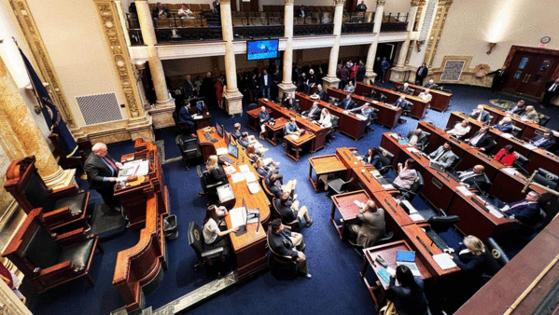Kentucky's budget to be impacted most by changes from One, Big Beautiful Bill
Published in News & Features
LEXINGTON, Ky. — Following the passage of the ‘One, Big Beautiful Bill’ this summer, Kentucky legislators say they will shift the way they make policy and create the state’s budget.
The federal tax and spending bill passed July 4 will largely impact the way the Kentucky General Assembly creates its two-year budget, said Speaker of the House David Osborne, R-Prospect, Monday at the Kentucky Chamber of Commerce’s Legislative Preview Conference in Lexington.
“I think this budget is going to present some unique challenges because there really are disparate ideas on how we approach (it),” he said.
As part of $100 billion budget negotiations looming for the start of 2026, legislators are certain they’ll be discussing what it means that they’re now shouldering costs shifted to them for Medicaid and the Supplemental Nutrition Assistance Program, or SNAP.
One in eight Kentuckians, about 13% of the state’s population, or some 600,000 people, rely on SNAP, data from the Center on Budget and Policy Priorities show. Next year, when the state is responsible for covering 75% of the program’s costs instead of 50%, administration of SNAP may increase by more than $60 million to over $200 million.
Due to changes enacted as part of the ‘Big, Beautiful Bill,’ people between the ages of 18 and 64 must show they are working, volunteering or in school to receive benefits. The work requirement may mean as many as 114,000 Kentuckians may lose access to SNAP, according to the Kentucky Center for Economic Policy.
Increased costs from SNAP could amount to an immediate hit of $180 million to the state’s budget, Sen. Chris McDaniel, R-Ryland Heights, said Monday. He chairs the Senate Appropriations and Revenue Committee and is co-chair of the 2026-28 Budget Preparation and Submission Statutory Committee.
That’s in addition, he said, to other costs related to Medicaid the state is responsible for since federal spending on the health insurance program is projected to decrease by more than $900 billion over the next decade under the ‘Big, Beautiful Bill,’ according to cost estimates from the Congressional Budget Office. Some of those cost cuts are a result of work requirements similar to those passed that apply to SNAP.
Kentucky stands to lose up to $28 billion in federal dollars it uses to insure those seeking medical care and prop up rural health care providers that employ thousands. Medicaid cuts put 35 rural hospitals in Kentucky at risk of closure, more than any other state in the country, according to estimates from this summer.
McDaniel was adamant Monday the state would make adjustments as necessary, but nonprofits and businesses reliant on small federal grants that were gutted in the federal tax and spending bill might not be so lucky.
“The state is not going to backfill federal programs that get changed. It’s just not going to happen,” McDaniel said. “We simply do not have the bandwidth or the financial wherewithal to do so.”
At a conference Wednesday hosted by Commerce Lexington to update regional business leaders on the chamber of commerce’s competitiveness plan that spans a nine county area around the city, Lt. Gov. Jacqueline Coleman said the upcoming session is important for the Beshear administration because it’s the final time they can impact the budget, or “a blueprint of your priorities,” she said.
“We are asking, have asked all of our offices in the executive branch to tighten their belts because the budget that’s coming is not going to look like the budget that’s existed in the past,” Coleman said. “You have the COVID dollars that are drying up, you have less revenue coming in because of tax decreases and things like that. And so, there will probably be some tough decisions because of that.”
Next year’s budget is the Beshear administration’s last, and Coleman said they are hoping it will firm up what they’ve accomplished and finish the job they started, she said. That means continuing to invest in economic development and job creation and “making sure that we are an education first administration,” she said.
Budget negotiations will also likely include a debate over whether legislators will decide to cut the state’s income tax again despite missing triggers in place that signal it’s financially sound to do so.
The state fell just $7.5 million in revenue short of the mark it set for itself to move forward with an income tax cut from 3.5% to 3% in 2027. The money is just part of last year’s total General Fund revenues of $15.7 billion.
The state’s personal income tax rate was 5% before a 2022 bill put Kentucky on its path to zero.
©2025 Lexington Herald-Leader. Visit at kentucky.com. Distributed by Tribune Content Agency, LLC.







Comments